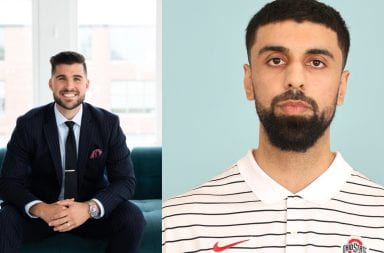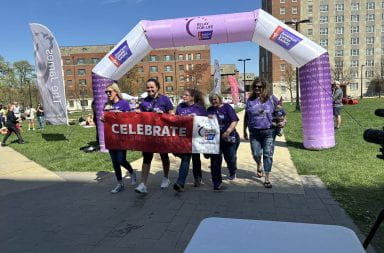
The reverse freshman 15 — the trend for students to go to excessive extremes to not gain weight — is becoming increasingly prevalent on college campuses. | Credit: Courtesy of TNS
The “freshman 15” is a common fear on college campuses, as well as a joke between family and friends wishing off their high-school seniors. However, the joke has taken a new turn as the reverse freshman 15 becomes more frequent among students who are avidly avoiding the extra pounds.
Dr. Diana Tieger, clinical manager at Eating Recovery Center of Ohio, said the new trend causes students to engage in compulsive habits related to diet and exercise.
Reverse 15 — the trend for students to go to excessive extremes to not gain weight—is not a clinically diagnosed disorder, but Tieger said there are warning signs that can indicate harmful health risks.
“Just because someone engages in compulsive health behavior doesn’t mean that they will trigger an eating disorder,” she said. “One way to tell if something is unhealthy is when someone talks a lot about food and weight and it becomes something they are focusing on, having a hard time focusing on other things in school.”
Warning signs have worked as a primary source for discovering those with eating disorders and new trends that are becoming prevalent.
Orthorexia, in relation to the reverse freshman 15, is a new epidemic prevalent among college students in which clean eating becomes obsessive and the person’s focus becomes a preoccupation on food quality over quantity consumption.
Though this is not a diagnosed disorder, Tieger said it is a phenomenon happening on college campuses, leading to the diagnosis of more well-known disorders — anorexia and bulimia.
Andrea Van Houten, a fourth-year in psychology, publicly shared her story of overcoming an eating disorder in hopes of encouraging others to seek the help they need to win their fight against their disorder.
“When I saw another thin girl in high school, it made me want to be skinnier and it was almost like a contest on who can be the skinniest,” Van Houten said. “Everything was about image and as a result I began to restrict food intake. I struggled up until college on skipping meals that would psychologically make me happier. But in the end, trying to achieve an unattainable perfect body became too much and I was able to seek the help I need to make a change.”
Van Houten — who is now free from her struggle with an eating disorder — said that although seeking help can be hard, it is an opportunity for freedom and for the start of a new life, if one takes the first step.
“Even if you talk with a friend, that can be enough to start the change you need to become better,” she said. “When you have an eating disorder, your greatest enemy is your mind. But when you reach out for help, you’re allowing yourself to receive the love and support you need to win. When you have strong individuals by your side, you can overcome your greatest enemy — the mind.”
For those who wish to seek help, the Eating Recovery Center is a resource nationwide with 11 different locations across the country that helps people who struggle with an eating disorder or think they have developed one.
The family of programs offered at the recovery centers include treatments for adult men and women, adolescents and children who have anorexia, bulimia, binge-eating and other unspecified eating disorders.
Ohio State students and families who struggle with dangerous compulsive health habits or think they might have an eating disorder can get help from the recovery center location in Ohio.
“Ohio [State] is such a huge university, it can be hard to find a resource and go somewhere,” Tieger said. “Here we offer free assessments by phone, but with a Master’s-level clinician. Taking the first step and reaching out to make that call can do a lot to get the help a person needs.”
For those who are struggling with an eating disorder or fear they might have one, they can reach the Eating Recovery Center at 877-711-1878 or complete a short form to request a free confidential consultation.


